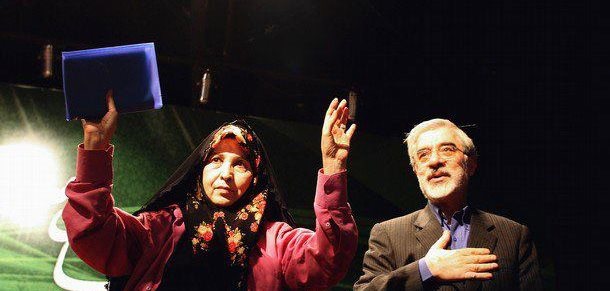FEATURED PHOTO: Zahra Rahnavard and Mir Hossein Mousavi
Tuesday marked the 1000th day that opposition leaders Mehdi Karroubi, Mir Hossein Mousavi, and Zahra Rahnavard have spent under strict house arrest.
Mousavi and Karroubi, both candidates in the disputed Presidential election, Mousavi’s wife Rahnavard, and Karroubi’s wife Fatemeh were arrested on 14 February 2011. Fatemeh Karroubi was released in summer 2011, but the others have been in constant detention even though no charges having been officially brought against them.
In September, the Rouhani administration raised hopes that the release of Karroubi and Mousavi might be in the offing by releasing 16 other political prisoners, including the prominent human rights lawyer Nasrin Sotoudeh.
See Iran Analysis: How Many Political Prisoners Can Rouhani Free?
Since then, however, human rights observers have been disappointed.
“Rouhani promised to seek the release of these opposition figures, and millions of Iranians trusted he would seek their release and voted for him,” said Hadi Ghaemi, the executive director of the International Campaign for Human Rights in Iran. “His supporters are still waiting for him to end these extrajudicial detentions, and clarify which institutions of the state are controlling these people’s fate.”
Asked at the end whether Rouhani’s government would set up a special committee to examine releasing the opposition figures from detention, Justice Minister Mostafa Pourmohammadi said, “The government will not interfere in these matters.” A few weeks earlier, Pourmohammadi had told reporters that the Supreme National Security Council would review the detentions, but four days later, a judiciary spokesman denied that would happen.
Mousavi’s and Karroubi’s families claim they have also been targeted by security officials.
In February, two days before the second anniversary of the arbitrary detentions, authorities arrested two of Mousavi and Rahnavard’s daughters, Zahra and Narges Mousavi, and the Karroubis’ son Mohammad Hossein. Officials released them later that day.
On October 24, Zahra and Narges Mousavi reported that a female security agent physically assaulted them during a visit to their parents’ home. Pourmohammadi later dismissed the claim as “noise from the media” .
Human Rights Watch sees the detentions as an important barometer of freedom within Iran’s political process.
Various United Nations organizations have repeatedly called on the Iranian government to release the three opposition figures, and have declared their detention arbitrary and unlawful. On February 11, 2013, three UN special rapporteurs called for the immediate release of Mousavi and Karoubi and their family members, along with other people who remain in prison for peacefully exercising their rights to freedom of opinion and expression, or freedom of association and assembly.
In August 2012, the United Nations Working Group on Arbitrary Detention, a body of five independent experts acting under the UN Human Rights Council, issued an opinion that the detentions are “arbitrary (and thus prohibited),” and recommended that the Iranian government release the detainees immediately and compensate them for their wrongful imprisonment. In September 2011, the UN Working Group on Enforced or Involuntary Disappearances initiated urgent investigations to determine the fate of the opposition figures, whose whereabouts had not been revealed at the time.
Other UN officials and bodies, including the secretary general, the special rapporteur on the situation of human rights in Iran, the Human Rights Council, and the General Assembly, have also characterized the detentions as arbitrary detention and called for the detainees’ immediate release.

